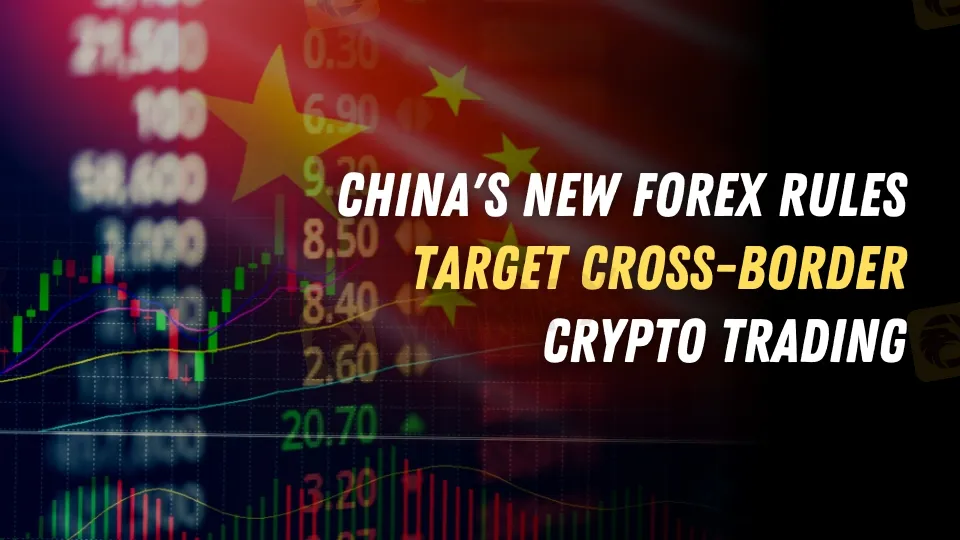简体中文
繁體中文
English
Pусский
日本語
ภาษาไทย
Tiếng Việt
Bahasa Indonesia
Español
हिन्दी
Filippiiniläinen
Français
Deutsch
Português
Türkçe
한국어
العربية
China's New Forex Rules Target Cross-Border Crypto Trading
Abstract:China's new forex rules tighten monitoring of cross-border crypto trades, requiring banks to track identities, fund sources, and trading frequencies.

China's new foreign exchange (FX) rules strengthen curbs on cross-border cryptocurrency trading in order to combat unlawful financial activity. These laws are yet another step in the country's continued efforts to impose its anti-crypto policy.
The Chinese foreign exchange regulator now compels banks to monitor and warn of potentially dangerous currency transactions, including those using cryptocurrencies. This includes cross-border gambling, underground banking, and other illegal financial transactions. Banks must now track the identities of individuals and institutions, as well as their funding sources and trade frequency.
According to a December 31 story by the South China Morning Post, new laws will make it more difficult for residents to own digital assets. According to Liu Zhengyao, a lawyer at ZhiHeng law firm, the regulations strengthen the legal basis for punishing crypto-related actions. He also pointed out that utilizing the yuan to buy cryptocurrency before converting it to foreign fiat currencies is now considered cross-border activity, making it practically difficult to avoid the limitations.
China has banned cryptocurrency trades since 2019. The government's main objectives were to reduce energy usage from cryptocurrency mining and to control greenhouse gas emissions. Financial institutions are also barred from conducting transactions involving digital assets or crypto-mining operations.
Despite its stringent policies, China remains the world's second-largest Bitcoin holder. According to Bitbo's Bitcoin Treasuries tracker, the government has roughly 194,000 BTC worth $18 billion. These holdings were acquired through asset seizures tied to illegal operations, as China's ban prohibits it from actively purchasing Bitcoin.

Number of countries holding Bitcoin. Source: BitcoinTreasuries.NET by Bitbo
Former Binance CEO Changpeng “CZ” Zhao claimed that China may someday adopt a Bitcoin reserve policy. Zhao stated at the Bitcoin MENA event in Abu Dhabi that if China chose to embrace Bitcoin, it may quickly adopt policies.
Final Thoughts:
China's new FX regulations highlight its commitment to regulating cross-border financial operations and curbing the usage of digital assets. These policies reflect the government's overarching purpose of ensuring financial stability and control. As the global cryptocurrency market evolves, the impact of China's policies on international markets and the future of cryptocurrencies will be crucial to monitor.

Disclaimer:
The views in this article only represent the author's personal views, and do not constitute investment advice on this platform. This platform does not guarantee the accuracy, completeness and timeliness of the information in the article, and will not be liable for any loss caused by the use of or reliance on the information in the article.
Read more

Bank Negara Malaysia Flags 12 New Companies for Unauthorised Activity
Bank Negara Malaysia (BNM) has updated its Financial Consumer Alert List (FCA List) by adding 12 more entities, reinforcing its efforts to warn the public against unregulated financial schemes. Check if your broker made the list!

TradingView Brings Live Market Charts to Telegram Users with New Mini App
TradingView has launched a mini app on Telegram, making it easier for users to track market trends, check price movements, and share charts.

Georgia Man Charged in Danbury Kidnapping and Crypto Extortion Plot
Georgia man James Schwab charged in Danbury kidnapping tied to $230M crypto heist. Plot targeted couple for ransom after Miami altercation with son.

Bybit Shuts Down NFT Marketplace Amid Crypto Market Downturn
Bybit announces the closure of its NFT marketplace, citing efforts to streamline offerings. Discover the latest trends in the declining NFT market and its shift to utility-based growth.
WikiFX Broker
Latest News
Exposing the Top 5 Scam Brokers of March 2025: A Closer Look by WikiFX
Gold Prices Climb Again – Have Investors Seized the Opportunity?
Webull Launches SMSF Investment Platform with Zero Fees
Australian Regulator Warns of Money Laundering and Fraud Risks in Crypto ATMs
The Withdrawal Trap: How Scam Brokers Lure Victims into Paying More
FCA to Investors: Think Twice Before Trusting These Brokers
Trump\s tariffs: How could they affect the UK and your money
Trump gambles it all on global tariffs he\s wanted for decades
TradingView Brings Live Market Charts to Telegram Users with New Mini App
HTFX Spreads Joy During Eid Charity Event in Jakarta
Currency Calculator







